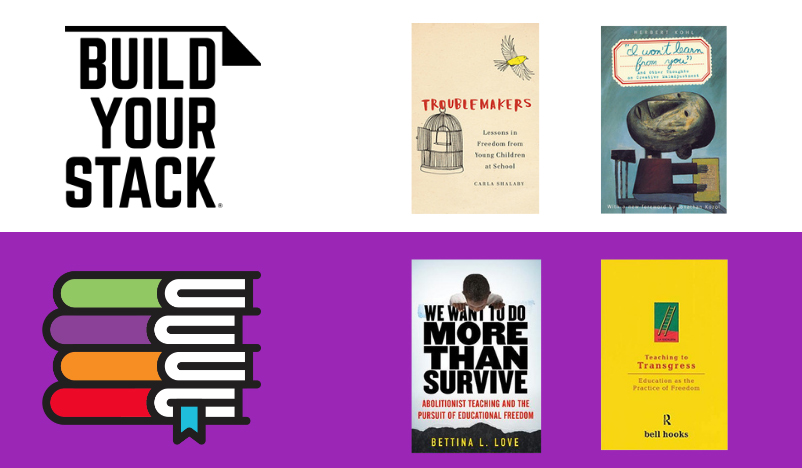This post was written by NCTE member Nathaniel Madden and is part of Build Your Stack,® an NCTE initiative focused exclusively on helping teachers build their book knowledge and their classroom libraries. Build Your Stack® provides a forum for contributors to share books from their classroom experience; inclusion in a blog post does not imply endorsement or promotion of specific books by NCTE.
You’ve seen the lists. You know, the lists of “classroom rules” being set for virtual schooling due to the pandemic—lists that contain brash invasions of personal privacy and autonomy, such as attempts to control what kids can(not) wear, when kids can(not) eat or drink, where kids can(not) engage with lessons in their own homes.
I saw one that went as far as to award students points for “keeping their eyes on screen 98% of the time.” While I hope these kinds of rules leave you feeling indignant, they also make perfect sense when you take into account the current state of in-person schooling in the vast majority of US schools. Control over the minds and bodies of our youth is foundational to the current carceral model of schooling in our country. Not only is this antithetical to learning, but it is causing deep harm. Education must become the pursuit and practice of freedom.
There are many excellent books by incredible educators that address this very topic. Not only have I endeavored to read as many of them as I can, but I have also been intentional about revisiting the books that I have already read in order to glean more of their genius. One can never underestimate the power of rereading!
Inevitably, I discover that there are insights about which I needed a reminder and plenty of wisdom that I missed during my first encounter. Below I’ve listed four books that I return to regularly because they inspire my own freedom-dreaming about what education could look like in my own classroom and in our world, and because they have given me the language with which to do it.
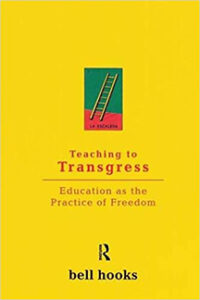 Teaching to Transgress: Education as the Practice of Freedom
Teaching to Transgress: Education as the Practice of Freedom
bell hooks
The first book in bell hooks’s irreplaceable “Teaching Trilogy,” Teaching to Transgress, should be a foundational text for any educator. In this book, she passionately writes about critical and liberatory theory and practice, as well as the importance of educators and students breaking away from the dominant oppressive systems of our society. As hooks writes, “To teach in a manner that respects and cares for the souls of our students” is at the heart of it all. Each time I engage with this text, I am called to examine my motivations for every choice I make as a teacher. I ask myself, “Does this choice honor the freedom of my students?” and “Does this choice honor my students’ souls?” Out of all my books on education, I revisit this one the most often.
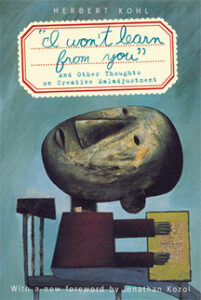 “I Won’t Learn From You” and Other Thoughts on Creative Maladjustment
“I Won’t Learn From You” and Other Thoughts on Creative Maladjustment
Herbert Kohl
This short collection of essays is an ode to each student’s humanity and right to determine their own lives. In these essays, Kohl writes about the importance of assent for anyone learning anything. Different forms of institutional oppression, such as white supremacy, sexism, and heterosexism, are ingrained in our curricula, and our students are being taught to reproduce them. It is right for us and them to resist this and thus be “maladjusted,” as Martin Luther King Jr. once wrote. Kohl writes, “I know of no finer gifts we adults, teachers or not, can give to children than nonnegotiable love, support, and all of the resources we can muster as they learn what they must do and resist doing what is foreign and alien to their internal imperatives.” Rereading any of these essays never fails to give me a timely reminder.
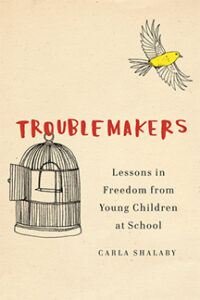 Troublemakers: Lessons in Freedom from Young Children at School
Troublemakers: Lessons in Freedom from Young Children at School
Carla Shalaby
In Troublemakers, Carla Shalaby calls our attention back to the most important voices in education: those of the students. Too often, the voices and therefore the lives of our students are ignored. But what happens when we take a radically different approach and genuinely listen to kids, especially the kids who have been measured by the system and found wanting? We discover that the problem has never been the human beings in the system, but the system itself. Shalaby writes, “School is trying to make people, but these young people insist they are already made.” I revisit this book to remind myself that every single person is invaluable in and of themselves, regardless of what the oppressive systems of our society try to make of them, and it is my responsibility as an educator to treat them with love and care.
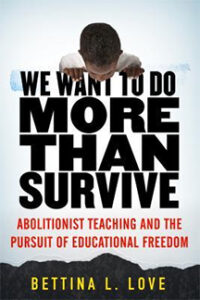 We Want to Do More Than Survive: Abolitionist Teaching and the Pursuit of Educational Freedom
We Want to Do More Than Survive: Abolitionist Teaching and the Pursuit of Educational Freedom
Bettina L. Love
Bettina Love is an essential voice today, not just for education but for our lives. We are reminded that an imperialist, colonial, white supremacist, sexist, heterosexist, capitalist system cannot be reformed. Love’s words and work show us that abolition and liberation are the only path forward. In We Want to Do More Than Survive, she writes,“Abolitionist teaching is not a teaching approach: It is a way of life, a way of seeing the world, and a way of taking action against injustice.” Whether it is from the theory, the applications, or the personal stories, I know that I can always go back to this text to learn more.
Every day provides a new opportunity to recommit myself to the work of liberation. These four books continue to spur my growth as an educator and a human being, and I will continue to return to them in the future.
 Nate Madden is an educator in Maryland, currently teaching and learning from fourth-grade students in a classroom dedicated to humanity and freedom. He is also currently working toward a master’s degree in educational equity. Most of his time is spent reading, learning from, and talking to people who know a lot more than him. You can find him @natebyr0n on Twitter.
Nate Madden is an educator in Maryland, currently teaching and learning from fourth-grade students in a classroom dedicated to humanity and freedom. He is also currently working toward a master’s degree in educational equity. Most of his time is spent reading, learning from, and talking to people who know a lot more than him. You can find him @natebyr0n on Twitter.
NCTE and independent bookstores will receive a small commission from purchases made using the links above.
It is the policy of NCTE in all publications, including the Literacy & NCTE blog, to provide a forum for the open discussion of ideas concerning the content and the teaching of English and the language arts. Publicity accorded to any particular point of view does not imply endorsement by the Executive Committee, the Board of Directors, the staff, or the membership at large, except in announcements of policy, where such endorsement is clearly specified.

